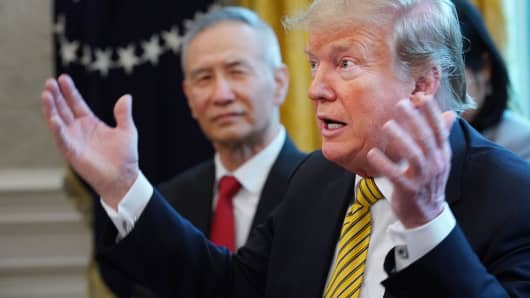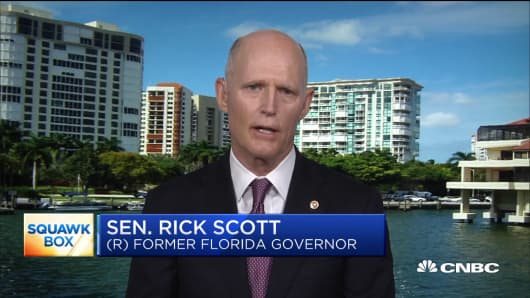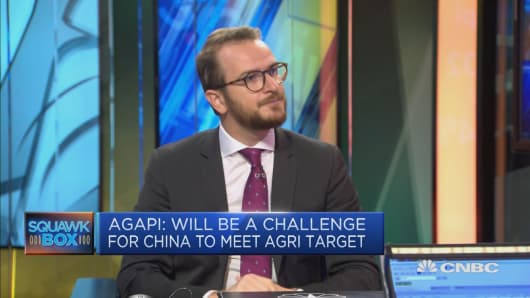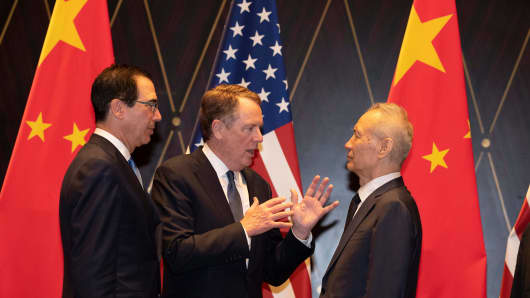

| 送交者: zeiou[★吏部尚书★] 于 2020-01-13 16:49 已读 2174 次 | zeiou的个人频道 |
For all the pomp and circumstance expected of the signing ceremony, many are still unsure of exactly what the two nations are agreeing to and how they'll enforce their deal.Corn options broker P.J. Quaid says "people have become pessimistic because a lot of the purchases [China] said they're going to make seem hard to attain."But the fact that Beijing is willing to crack down on policies concerning forced technology transfer is key, says former White House trade advisor Clete Willems. 6park.com 6park.com
Chip Somodevilla | Getty Images 6park.comU.S. President Donald Trump (R) and Chinese Vice Premier Liu He talk to reporters in the Oval Office at the White House April 04, 2019 in Washington, DC. 6park.comU.S. and China trade representatives will end years of intense bilateral negotiations with a "phase one" deal on Wednesday that promises billions of dollars' worth of agricultural purchases and the beginning of reforms to China's longstanding practice of forced technology transfer.
For all the pomp and circumstance expected at the signing ceremony — and repeated assurances from American negotiators — many are still unsure of exactly what the two nations are agreeing to.
On paper, the deal includes a "dramatic expansion of U.S. food, agriculture and seafood product exports" as well as an agreement by China to end its long-standing practice of forcing or pressuring foreign companies to transfer their technologies to Chinese companies, according to a U.S. Trade Representative document.
6park.com6park.com The USTR has also said the deal reiterates U.S. opposition to currency manipulation and a commitment by China to buy at least $200 billion in U.S. exports over the next two years.
"We have been going through a translation process that I think we said was really a technical issue," Treasury Secretary Steven Mnuchin told Fox News on Sunday. "And people can see. This is a very, very extensive agreement."
Top negotiators, including Mnuchin, U.S. Trade Representative Robert Lighthizer, and others are expected to attend the signing on Wednesday in Washington. 6park.com
Sen. Rick Scott: I don't believe China will ever comply on trade6park.com P.J. Quaid, a corn options broker at the CME Group in Chicago, said he's eager to learn how the White House plans to enforce the tenets of the phase one deal if Beijing skirts its obligations.
"This thing's been a crazy roller coaster since it started. A lot of people have become pessimistic because a lot of the purchases they said they're going to make seem hard to attain," Quaid said.
"If this thing comes in under expectations, you could see sell-off," he added. "It's been a rough time for people trading Ags." The Office of the United States Trade Representative did not return CNBC's request for comment.
Others were cautious after a Chinese media report suggested that Beijing isn't as upbeat on the prospect for future trade talks. Taoran Notes, a blog run by a state-owned newspaper called Economic Daily, published its first blog post in two months on Sunday.
"We need to bear in mind that the trade war is not over yet. The U.S. hasn't removed all the tariffs on Chinese imports and China is still imposing its retaliatory duties," the blog wrote according to a CNBC translation. "There are still so many uncertainties ahead."
For Don Roose, president of Des Moines, Iowa-based brokerage U.S. Commodities, China's commitments to farm purchases are key.
"We're anticipating $35 billion [of farm purchases] the first year and $40 billion in the second," he said. "It doesn't look like we're creating any new world demand." But unresolved, Roose said, is whether the Chinese will — after years of haggling — actually end up buying more U.S. farm goods than before President Donald Trump opened the trade spat nearly two years ago.
Still, Roose said he was slightly more optimistic with a phase one deal nearly signed.
"There's always a question mark, but if they want to get to 'phase two,' they're going to have to show some solid follow-through," he said. 6park.com
Chinese importers prefer Brazilian soybeans to American ones: S&P Global Platts6park.com Still, others cautioned against reading too much into the specifics of U.S. purchases instead of the broader, structural changes agreed to by China.
The fact that Beijing is willing to crack down on policies concerning forced technology transfer and lower some obstacles for U.S. companies in China is key, according to attorney Clete Willems, who previously worked at USTR and the White House.
"There's a lot of talk about specific agricultural sales. But China's going through and addressing longtime, systemic barriers to U.S. products," including biotechnology, Willems said.
That's likely an underappreciated part to any hopes of boosting U.S. grain exports to China, which has long bristled at American genetically modified crops, he added. Beijing approved genetically modified soybeans and papaya from the U.S. last month after the announcement of the phase one deal.
"The structural elements of this deal are going to be more important in the longer term than the specific purchases," Willems said. "Remember: We started this whole thing because of Section 301 including the forced tech transfers."
"Of No. 1 importance is the fact that USTR did in fact get commitments from China on the major elements of the Section 301 report," he added.
Trump based his use of U.S. tariffs against China on Section 301 of the U.S. Trade Act of 1974, which allows the president to levy sanctions against countries that break trade agreements or respond to unfair, unreasonable or discriminatory trade practices. 6park.com
Why former top White House negotiator Clete Willems was impressed by the China trade deal6park.com The USTR cited longstanding U.S. executive complaints that they are routinely pressured, or forced, to share critical technologies in exchange for access to China's sizable markets in approving Trump's use of Section 301. Other areas of concern include the theft of trade secrets, misuse of pharmaceutical-related intellectual property and access for U.S. financial companies to Chinese markets.
And, as Willems pointed out, there's always the option of reintroducing levies if China fails to meet its obligations.
"On enforcement, I don't think anyone should question the rigor of this enforcement mechanism. If there is a problem, if China doesn't address a problem, the U.S. can put tariffs back in place." 6park.com




